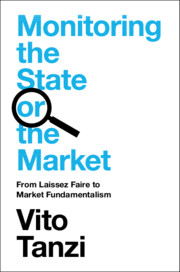Book contents
- Monitoring the State or the Market
- Monitoring the State or the Market
- Copyright page
- Contents
- Preface
- Acknowledgments
- Part I The Period until the Great Depression
- Part II From Laissez Faire to Welfare States: 1930 to 1970
- Part III The Period after the 1970s
- 13 A Return to Laissez Faire?
- 14 The Policies of Market Fundamentalism
- 15 The Growing Importance of Monetary Policy
- 16 Equity Aspects of Market Fundamentalism
- 17 Other Aspects of Market Fundamentalism
- 18 Cultural Aspects of Market Fundamentalism
- 19 Growing Conflict between Efficiency and Equity
- 20 Intellectual Property and Venture Capitalists
- 21 The World in the Twenty-First Century
- 22 The Impact of New Economic Developments on the Market and Democracy
- 23 More on Economy and Culture in the Present Time
- 24 Some Summing Up and Concluding Observations
- References
- Index
15 - The Growing Importance of Monetary Policy
from Part III - The Period after the 1970s
Published online by Cambridge University Press: 07 December 2023
- Monitoring the State or the Market
- Monitoring the State or the Market
- Copyright page
- Contents
- Preface
- Acknowledgments
- Part I The Period until the Great Depression
- Part II From Laissez Faire to Welfare States: 1930 to 1970
- Part III The Period after the 1970s
- 13 A Return to Laissez Faire?
- 14 The Policies of Market Fundamentalism
- 15 The Growing Importance of Monetary Policy
- 16 Equity Aspects of Market Fundamentalism
- 17 Other Aspects of Market Fundamentalism
- 18 Cultural Aspects of Market Fundamentalism
- 19 Growing Conflict between Efficiency and Equity
- 20 Intellectual Property and Venture Capitalists
- 21 The World in the Twenty-First Century
- 22 The Impact of New Economic Developments on the Market and Democracy
- 23 More on Economy and Culture in the Present Time
- 24 Some Summing Up and Concluding Observations
- References
- Index
Summary
This chapter covres: monetary policy acquires more importance; interest rates generally fall; markets for goods and money become global, facilitating borrowing; global markets are considered more efficient in the absence of disruptions, bottlenecks, and nationalistic policies; the faster growth of some large but poorer countries leads to a better global income distribution; public spending generally resists major attempts at reduction; tax levels stop rising; the good period ends suddenly in 2008 with the financial crisis and the Great Recession; this puts an end to market fundamentalism; the pandemic of 2020 and the war in Ukraine conclude the period of reduced government role; public debts reach record levels and inflation returns, creating major dilemmas for central banks on how to react; and interest rates start going up after a long period of low rates and relaxed monetary policy.
- Type
- Chapter
- Information
- Monitoring the State or the MarketFrom Laissez Faire to Market Fundamentalism, pp. 111 - 116Publisher: Cambridge University PressPrint publication year: 2023

